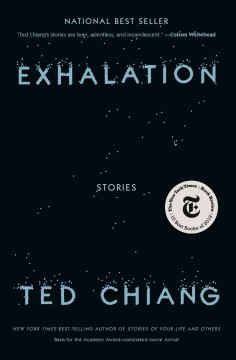What makes a story science fiction? We didn’t discuss this at our meeting, but we probably should have.[i] In the past ten years, our group has read about twelve books I would classify as speculative fiction and fantasy, with War of the Worlds, The Martian, and Frankenstein the most technology based. And two of those were written in the nineteenth century! In addition, I believe this is only our second collection of short stories.
I encouraged everyone to read at least the first story, “The Merchant and the Alchemist’s Gate,” because I believed it was the most likely to be enjoyed. According to the Author’s “Story Notes,” he set out intentionally to make a story in which the inability to change the past was not “necessarily a cause for sadness.”[ii]
In general, the majority of our responders liked this story, and several mentioned the author’s final sentences: “Nothing erases the past. There is repentance, there is atonement, and there is forgiveness. That is all, but that is enough.” During the meeting, we few discussed the idea of destiny and free will, a theme in most of the stories in this collection. If you can travel into the future but not do anything differently in the past when you return to change that destiny, do you still have free will? At what age is traveling to view the future less appealing? KC identified with the desire to revisit the past in order better to understand and perhaps find closure for histories that are hard to let go. I also mentioned Paul Coelho’s The Alchemist (1988), an oft-requested allegorical novella that concerns making one’s destiny happen. Why did Chiang choose an alchemist as the creator of the time portal?
As we discussed this first story, we segued into other stories as well as personal reflections. Ted Chiang’s stories, even when they are filled with technology as is the title story “Exhalation,” are primarily philosophical. Our science fiction readers have noted that some of the ideas covered in this collection—time travel, artificial intelligence, multi-world theory—are not new, but the author’s humanity impresses me even as the science and philosophy make my brain hurt!
Several responders could not get interested in many of the stories beyond “The Merchant and the Alchemist’s Gate.” So much has been lost this year that I would like to include these excerpts from this story, even though we did not discuss them:
- “like eternal fire, grief burns but does not consume, instead it makes the heart vulnerable to further suffering.”
- “grief owes no debt.”
I miss our larger meetings, even though sometimes in the past the group size was overwhelming. I appreciate how connected we have stayed, at least through email, and I will post responses for Exhalation in the comments. A good story or idea may return to us for years and be very different when revisited! This journal may not be as accurately recorded as the video from the story “The Truth of Fact, The Truth of Feeling,” but I hope you will find it a reliable catalyst for these times of our lives and our reading. Thank you for sharing your time and memories with us.
- PREVIOUS SPECULATIVE (SF & FANTASY) FICTION SELECTIONS
- (Descending order when read by Whitney Book Bistro)
- Spoonbenders (2017) Daryl Gregory MAY 2019
- Elevation (2018) Stephen King DECEMBER 2019
- The Martian (2014) Andy Weir MARCH 2018
- The Yiddish Policemen’s Union (2007) Michael Chabon MAY 2017
- Station Eleven (2014) Emily St. John Mandel MAY 2016
- Frankenstein (1818) Mary Wollstonecraft Shelley JANUARY 2015
- The Ocean at the End of the Lane (2013) Neil Gaiman JUNE 2015
- Wicked (1995) Gregory Maguire APRIL 2014
- Dog Stars (2012) Peter Heller JUNE 2014
- Flight Behavior (2012) Barbara Kingsolver DECEMBER 2013
Previous Short Story Collection selected: This Is How You Lose Her (2012) Junot Diaz
- RECOMMENDED BY CHERYL B.
- Classic Sci-Fi: War of the Worlds, H.G. Wells
- Fantasy: Dragonflight, Anne McCaffrey
- If you want to think: Dragon’s Egg, Robert L. Forward and Stranger in a Strange Land, Robert Heinlein
- Hitchhiker’s Guide to the Galaxy, Douglas Adams
- If you want to read a very long saga, try the Foundation series by Isaac Asimov
- [i] According to dictionary.com, Science Fiction is “a form of fiction that draws imaginatively on scientific knowledge and speculation in its plot, setting, theme, etc.” Based on the THE RANDOM HOUSE UNABRIDGED DICTIONARY, © RANDOM HOUSE, INC. 2021. Web accessed 5-13, 2021: https://www.dictionary.com/browse/science-fiction. Several other definitions include more specifically “fiction dealing principally with the impact of actual or imagined science on society or individuals.” Similar definitions were found through Google and Britannica.com. This particular definition came from Merriam-webster.com and was web accessed 5-13-2021: https://www.merriam-webster.com/dictionary/science%20fiction.
- [ii] At the end of the book, the author includes “Story Notes” in which he explains his inspiration for writing each story and reading these can not only help with understanding the stories, but is interesting in general.
